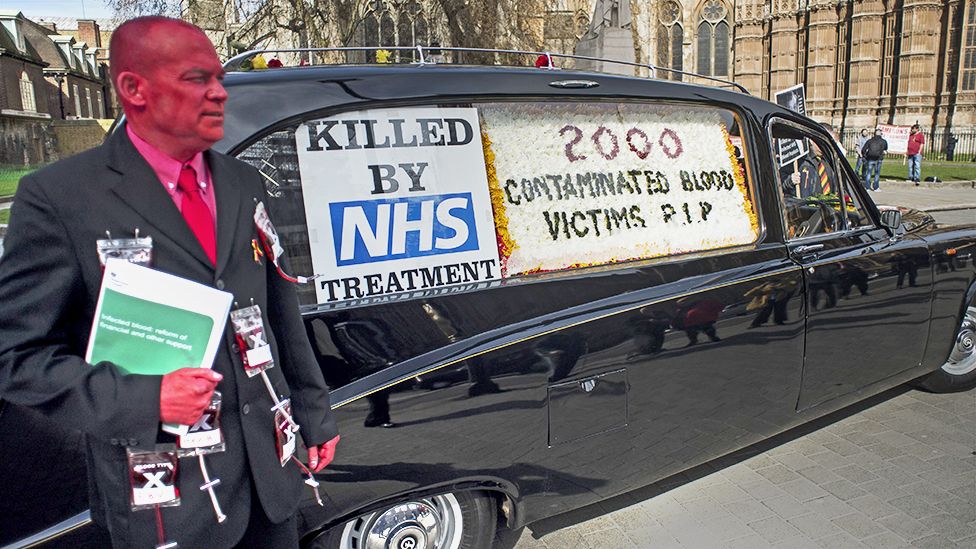ARTICLE AD BOX
 Image source, Shutterstock
Image source, Shutterstock
Victims and their relatives campaigned for decades for a public inquiry into the scandal (pictured in 2016)
By Jim Reed
Health reporter
The parents and children of victims of the contaminated blood scandal should receive government compensation, a judge has said.
The chairman of the infected blood public inquiry, Sir Brian Langstaff, said it was time to "recognise deaths which have so far gone unrecognised".
More than 3,000 people died after contracting HIV or hepatitis C via NHS treatments in the 1970s and 80s.
The government must now respond to the recommendations.
It had previously agreed to pay £100,000 interim compensation to around 4,000 victims and bereaved widows.
Sir Brian said a final compensation framework should be set up by the end of the year for that group.
"It will clearly take political will to act quickly, but the circumstances here warrant it," he said.
Giving evidence in 2021, then health secretary Matt Hancock said "of course" compensation would be paid to victims and their families if the public inquiry formally called for it.
'Time to put right'
The long-running public inquiry into the infected blood scandal started taking evidence in 2019.
In August 2022, the government agreed to make the first interim compensation payments of £100,000 each to around 4,000 surviving victims, and bereaved widows.
Previously, those infected with HIV and hepatitis C had survived on annual financial support payments, but had never been compensated for loss of earnings, care costs and other lifetime losses.
At the time, victims' groups said the decision was a major step towards an official admission of responsibility for what's been called the worst treatment disaster in the history of the NHS.
In a second set of interim recommendations, Sir Brian Langstaff has now said interim compensation payments should be extended to the parents and children of those who were infected and lost their lives.
'I believe this is necessary to alleviate immediate suffering," said the inquiry chair Sir Brian Langstaff.
"It is a fact that around 380 children with bleeding disorders were infected with HIV. Some of them died in childhood. But their parents have never received compensation.
"Children who were orphaned as a result of infections transmitted by blood transfusions and blood products have never had their losses recognised. It's time to put that right," he said.
Tim Wratten's father and two uncles died from hepatitis C after receiving infected blood. He now campaigns for children of those affected.
"I only found out when I was 16 that my dad had it," he told the BBC Today Programme.
"It's a lot to take on, growing up trying to understand the impact of the virus.
"He used to get angry because you've got this horrible virus going through your body, but you've got to go to work and carry on."
Tim said he didn't receive any counselling or support, and feels children were "brushed under the carpet".
What is the infected blood scandal?
Thousands of NHS patients with haemophilia and other blood disorders became seriously ill after being given a new treatment called factor VIII or IX from the mid-1970s onwards.
At the time the medication was imported from the US where it was made from the pooled blood plasma of thousands of paid donors, including some in high-risk groups, such as prisoners and drug users.
Video statements were played at the start of the public inquiry in September 2018
If a single donor was infected with a blood-borne virus such as hepatitis or HIV then the whole batch of medication could be contaminated.
It's thought around 1,250 people with bleeding disorders were infected with HIV with half of that group later dying of HIV related causes.
The inquiry estimates that another 30,000 UK patients were also exposed to hepatitis B or C through the same treatment or a blood transfusion after childbirth or hospital surgery.
More than 2,000 died of liver disease or cancer linked to the infection.
'Full compensation'
Sir Brian also said that a full compensation scheme should be set up immediately for victims of the scandal, including those who have already received interim payments.
That would mean individuals can claim compensation for care costs, financial harm and societal harm.
It would cover increased payments for people who could not have children because of their infection, or who lost their jobs because of the stigma of HIV/Aids in the 1980s and 1990s.
The inquiry team is then expected to produce a final report into the scandal, with a list of recommendations, at some point in the autumn.

 1 year ago
54
1 year ago
54








 English (US) ·
English (US) ·